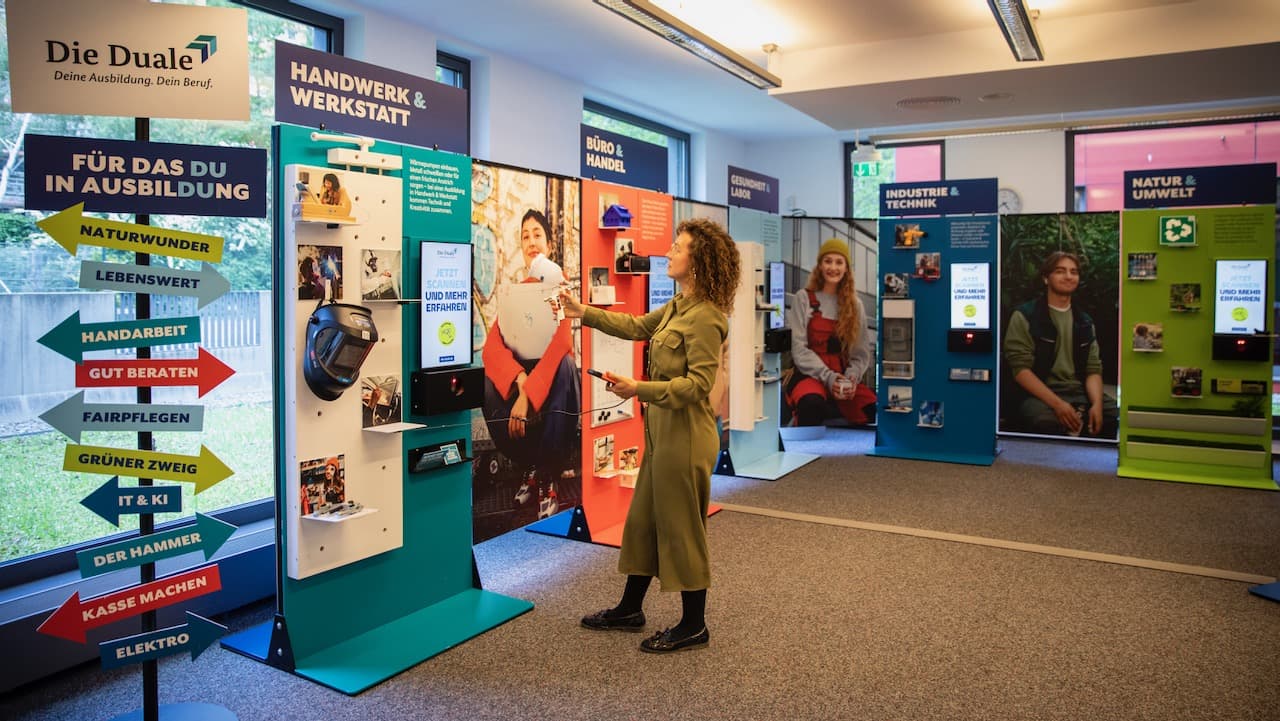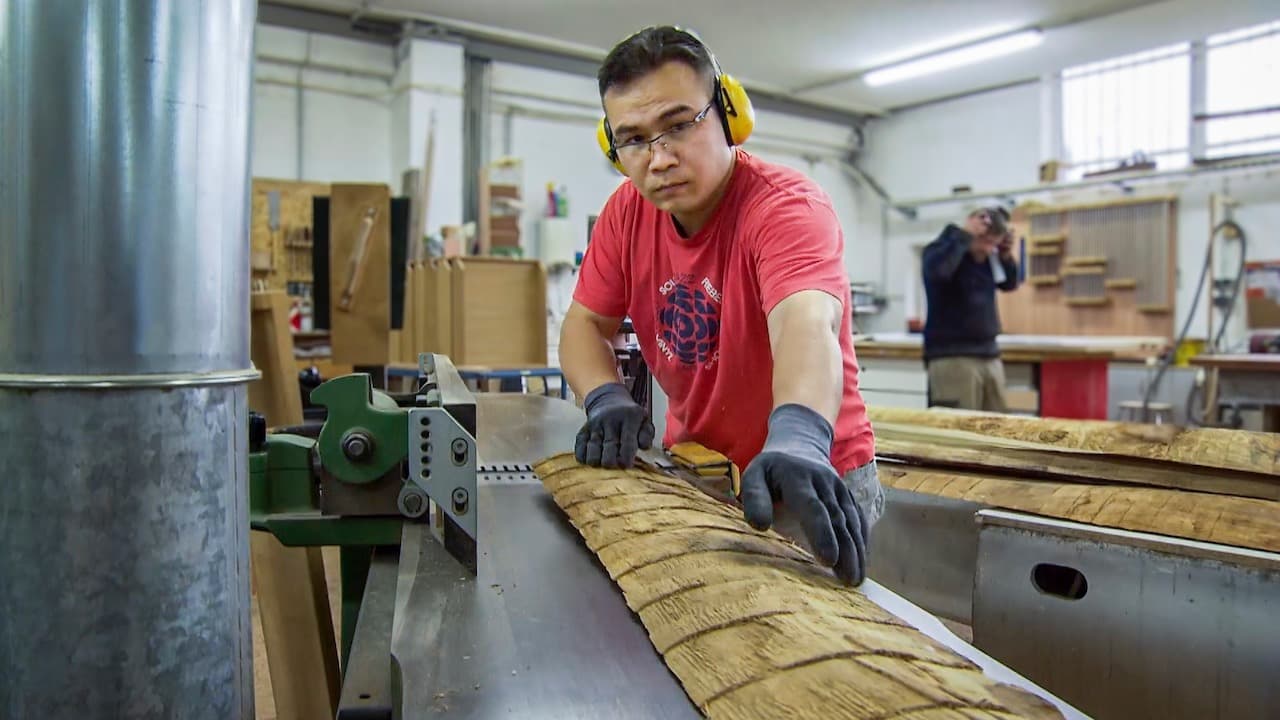School-based Vocational training
What types of vocational education and training are there?
If you want to find a job in Germany, a good alternative to studying at university is taking part in a vocational training programme. These training programmes usually last between one and three-and-a-half years. They are either school-based and take place solely in a classroom (“schulische Ausbildung”) or combine classes with practical training in an establishment or company (“Duale Ausbildung”). This chapter provides you with detailed information and useful links on school-based vocational training. To find out more about dual vocational training programmes, check our chapter “Dual Vocational Training”.
Upon completion of a vocational training programme, you become a skilled worker (“qualifizeierte Fachkraft”). Skilled worker are in demand in Germany and earn more money for their work compared to unskilled workers. So, completing a vocational training programme may constitute an important step towards building a career in Germany.
What do I need to know?
What is a school-based vocational training programmes?
There are vocational training programmes which take place only in the classroom. This particularly include health- and care-related jobs as well as jobs dealing with design, sales or technical areas. In a school-based vocational training programme, you study at a vocational college or trade school and acquire hands-on training and put the knowledge you have acquired into practice in the form of long internships in companies or social work organisations. The school-based vocational training programmes usually take between one to three years to accomplish. You are free to choose between state-funded and private schools, but keep in mind that you often have to pay tuition fees in the latter.
Do I qualify for vocational training in Germany?
You must be able to speak German, as the language of school programmes and everyday communication in the companies is German. The level of German proficiency required depends on the type of vocational training you've chosen.
The school-leaving certificate you need to start vocational training depends on your career aspirations and the vocational training programme you've chosen. If you have obtained your school-leaving certificate from your home country, first you should have it recognised in Germany. You can read more in our chapter "Certified Copies".
To apply for school-based vocational education, you need to apply at a vocational school; and to do so, you require a school-leaving certificate from a German school or an equivalent recognised certificate from your home country. The higher your school-leaving certificate, the better your chances of being accepted at the vocational school will be better. For some professions, you also need to submit proof of work experience in the field (for example, a certificate of internship). You can learn more about relevant school-leaving certificates in your federal state in our chapter School.
In some fields, you must have reached a certain age to apply for vocational training. Apart from this, there is no age restriction. So, it does not matter how old you are when you start vocational training, but you need to have finished basic compulsory education (nine years in Germany). Learn more in our chapter School.
What type of residence permit do I need for school-based vocational training?
In principle, third-country nationals need a residence permit for the purpose of voctional training in order to be able to join a training programe in Germany. You can find out more in our chapter "Vocational Training Visa".
For people who have fled to Germany, the following applies:
You can start school-based vocational training ("Schulische Ausbildung") anytime without the need to get a work permit.
Vocational training as an opportunity for obtaining a secure residence permit
You can obtain a tolerated stay permit (“Duldung“) if you start (or are going through) vocational training in Germany. This form of permit is known as "Ausbldungsduldung". You can learn more about it in our chapter "Ausbldungsduldung”.
How can I find a trainee position?
The German state provides support for people looking for a job or training opportunity. The Federal Employment Agency is responsible for this service. The Federal Employment Agency and the Jobcentre offer cost-free counselling on training and employment. Their staff, however, almost exclusively speak German.
The counselling centres of the Youth Migration Service (JMD) and Counselling Office for Adult Migrant ("Migrationsberatung für Erwachsene") also provide assistance in your search for a training position. Their staff speak several languages.
Also on www.ausbildung.de , http://www.azubi.de, planet-beruf.de and kursnet, you can search for a vocational training position.
How and when can I apply?
For school-based vocational training, you must apply at the school of your choice. Keep in mind that schools often have application deadlines. For more information, you need to contact the school directly.
On http://www.azubi.de/ you will find instructions on how to write a successful application (in German). There are also some guidelines which prepare you for the job interview. You can also find useful information about the correct format for an application portfolio and the appropriate attitude during a job interview on planet-beruf.de. The counselling centres of the Youth Migration Service (JMD) and Counselling Office for Adult Migrant("Migrationsberatung für Erwachsene") also provide assistance in your search for a job. On BAMF's website, you can find a JMD office in your area or search for a Counselling Office for Adult Migrant nearby. Their staff speak several languages. You can find out more about the job seeking and application process by reading our chapter "Job hunting and application".
How can I make a living during my school-based vocational training?
During school-based vocational training ("Schulische Ausbildung"), in principle, you do not earn money. For some of the private schools, you even have to pay tuition fees. Exception: If you opt for vocational training in the health /care sector, since training includes a long practical phase in hospitals and nursing homes, you will receive a salary. In health care and the nursing profession, for instance, depending on the federal state, trainees earn between €900 and €1300 gross per month during the first year of training. Social security contributions and possibly taxes will be deducted from this salary.
Under certain conditions, you can get student allowance ("Schüler-BAföG") during your school-based vocational training. BAföG ("Bundesausbildungsförderungsgesetz") is a state-sponsored financial aid programme for school children and university students. The amount of support is calculated on a case-to-case basis and is €992 per month (as of 2024). Unlike student BAföG, you usually do not have to pay back what you have received as BaföG during your training.
In order to receive BAföG, you must meet the following requirements:
- You must be under the age of 30 at the beginning of your school-based vocational training. Exception: There is no age restriction for recognised “refugees” and asylum seekers. That means they can also apply for BAföG with over 30 years of age.
- The training programme must take at least 2 years to accomplish.
However, non-German citizens are only supported, if:
- they are EU citizens with the right to permanent residence according to the European "Freedom of Movement" Act.
- they have a permanent residence permit or an EU permanent residence permit.
- they are a recognised “refugee”, entitled to asylum or subsidiary protection.
- they have a tolerated stay or "Duldung" and have been legally residing in Germany for at least 15 months. During the first 15 months, you will receive asylum seekers’ benefit (“Asylbewerberleistungen”).
- they have been in Germany for at least 5 years and were gainfully employed during this time.
- at least one of their parents has been in Germany for a total of (at least) three years during the last six years while being engaged in a gainful employment.
To find out which authority is responsible for your BAföG application, you can call the BAföG hotline at 0800-223 63 41. You can also visit visit bafög.de to find out more about the responsible authority and necessary documents for the application.
In principle, you cannot receive “Bürgergeld” during school-based vocational training (Exception: If you are participating in a school-based vocational training programme which will end with a general school-leaving qualification (such as a Fachabitur or Abitur), you can apply for “Bürgergeld” at Jobcentre).
You can also apply for a housing allowance or "Wohngeld", which is a financial aid to help you pay for your rent. The prerequisite for receiving housing allowance is being of legal age and living independently of your parents. To find the relevant authorities, search the Internet using the word "Wohngeld" and the name of your city as keywords.
During the training programme, you can work in another job for up to ten hours a week.
Which type of vocational training suits me?
In order to find the appropriate training programme, you can seek advice from the Employment Agency or call the hotline 0800/4 5555 00 (free of charge within Germany, from abroad you need to call 0049 911 12031010, for which there is a service fee). The experts there help you find a training programme which suits your qualifications and interests. Their staff, however, only speak German. There are also websites such as www.ausbildung.de, Berufenet, azubi.de, planet-beruf.de, www.berufe.tv and the IHK job search engine where you can read job descriptions and what each profession entails. The youth migration service ("Jugendmigrationsdienst" or JMD) and adult migrant counselling centre ("Migrationsberatung für Erwachsene") help you to choose the right vocational training programme. The staff there speak many languages.
You can also find events related to working life on the website of the Employment Agency. Furthermore, you might like to take a look at the so-called positive list ("Positivliste") to find vocational vocational training programmes for occupations referred to as shortage occupations or "Mangelberufe" in Germany. This means that there are many vacancies and a work permit is easier to obtain if you decide to start vocational training in these fields. The "positive list" adapts to changes in the job market.
What comes after accomplishing the vocational training?
At the end of your training, you will receive a certificate from the vocational school, the vocational academy (“Berufsakademie”) or the chamber (HWK or IHK), which has organised the training programme.
But what comes next? Maybe you have already thought about your professional goals before starting your training programme. There are many possibilities: you can start a job, go for further training or enter university.
Important
Vocational training is worthwhile. Not only it gives you the chance of a well-paid job, but also the opportunity to obtain permanent residence in Germany.
Similar topics
Additional links
Youth Migration Service (JMD)
The counselling centres of the Youth Migration Service (JMD) offer support and advice to refugees and migrants under the age of 27 on various topics in many different languages.
German for Nurses
Do you want to work in the nursing service? With this application, you can practice daily work-related situations in German. This is a free educational game useful for people in B1 level and higher.
MBE
The Adult Migration counselling Service (MBE) offers support to adults (+27) on the topic of vocational training in many different languages.
hr integrate
hr integrate supports job-seeking Refugees by connecting them to Human Resources Managers in different organisations.
German for Work
Download lunes.app to learn German vocabulary relevant to training and work in different fields such as handicraft, health care and office work.
Our community in the forum
Quickly find answers to any question. Benefit from the experience of your community and exchange ideas.
Support on site
Are you looking for counseling centers, meeting points, and other services? Use our search engine.









